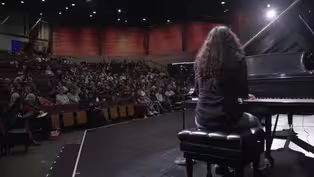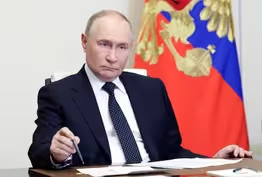
What's ahead for U.S. as global market reacts to tariffs
Clip: 6/4/2025 | 6m 34sVideo has Closed Captions
What's ahead for U.S. economy as global market reacts to Trump's tariffs
The Congressional Budget Office released an analysis of the impact of President Trump’s tariffs. It projects current policies would reduce the deficit by $2.8 trillion over the next decade, but raise inflation and shrink the size of the economy. It comes as Trump issued new tariffs on steel and aluminum overnight, doubling them from 25 to 50 percent. Geoff Bennett discussed more with Babak Hafezi.
Problems playing video? | Closed Captioning Feedback
Problems playing video? | Closed Captioning Feedback
Major corporate funding for the PBS News Hour is provided by BDO, BNSF, Consumer Cellular, American Cruise Lines, and Raymond James. Funding for the PBS NewsHour Weekend is provided by...

What's ahead for U.S. as global market reacts to tariffs
Clip: 6/4/2025 | 6m 34sVideo has Closed Captions
The Congressional Budget Office released an analysis of the impact of President Trump’s tariffs. It projects current policies would reduce the deficit by $2.8 trillion over the next decade, but raise inflation and shrink the size of the economy. It comes as Trump issued new tariffs on steel and aluminum overnight, doubling them from 25 to 50 percent. Geoff Bennett discussed more with Babak Hafezi.
Problems playing video? | Closed Captioning Feedback
How to Watch PBS News Hour
PBS News Hour is available to stream on pbs.org and the free PBS App, available on iPhone, Apple TV, Android TV, Android smartphones, Amazon Fire TV, Amazon Fire Tablet, Roku, Samsung Smart TV, and Vizio.
Providing Support for PBS.org
Learn Moreabout PBS online sponsorshipAMNA NAWAZ: Welcome to the "News Hour."
We begin tonight with a new estimate of how much President Trump's spending and tax cut bill would cost and its potential impact on health care coverage.
The independent nonpartisan Congressional Budget Office, or CBO, projects that the bill would add $2.4 trillion overall to the deficit over the next decade.
And it estimates that changes to Medicaid and other health coverage would leave nearly 11 million Americans uninsured by 2034.
GEOFF BENNETT: The one big, beautiful bill, as it's called, would reduce federal government spending by nearly $1.3 trillion.
And the CBO found that, by extending President Trump's 2017 tax cuts, the bill would cut taxes by $3.75 trillion over the next decade.
The measure awaits action in the Senate after it passed the House last month without Democratic support.
Today, House Republicans shrugged off the CBO score.
REP. STEVE SCALISE (R-LA): Go back to 2017.
You don't need to go back that far to see how wrong the CBO has been when it comes time to make prognostications on economic growth.
They have always been wrong and they have always ignored what tax cuts will do to grow the American economy.
AMNA NAWAZ: Senate Democratic leadership, meanwhile, said there would be real-world consequences to people's health care.
SEN. CHUCK SCHUMER (D-NY): People will fall through the cracks and get phased out of coverage in the coming years, death by 1,000 paper cuts.
GEOFF BENNETT: The CBO also released a separate analysis today about the impact of President Trump's tariffs.
It projects current tariff policies would reduce the federal deficit by $2.8 trillion over the next decade, while also raising inflation and shrinking the size of the economy.
That deficit savings is a bit more than the big spending and tax cut bill would cost.
It comes as President Trump issued new tariffs on steel and aluminum overnight, doubling them from 25 to 50 percent.
For more, we're joined by Babak Hafezi.
He's an adjunct professor at American university's Kogod School of business and CEO of Hafezi Capital.
That's an international consulting firm.
So, President Trump announced these sweeping tariffs last week during a visit to Pittsburgh, catching a lot of people off guard.
Help us understand the administration's rationale.
Why move forward with this right now?
BABAK HAFEZI, Adjunct Professor, American University: They're in the middle of negotiations, so this could be an item to bring through the negotiation process.
It is also -- he went to a place where development of steel is very, very high.
So it was a very friendly audience.
So that's another element as well.
But the rationale is ultimately tax collection.
Tax collection is what matters.
There's a tax package going through, and this adds to the dollar value that makes it positive.
GEOFF BENNETT: And the Trump administration argues that these tariffs will help protect and grow the American steel and aluminum industry.
Do they have that right?
BABAK HAFEZI: Partially right.
They will produce a certain level of jobs, but ultimately they make American companies uncompetitive globally.
The price of American steel is the highest in the world and, ultimately, we are not competitive.
So for the domestic market, yes, we will own the domestic market.
But beyond that, American corporations will have to buy corporations abroad to sell globally.
It also creates a lot of -- it creates a certain level of imbalances within the American economy, allowing inefficient businesses to be afloat for a longer period of time.
GEOFF BENNETT: And so what does a 50 percent tariff on steel and aluminum, what does that mean for our trading partners?
BABAK HAFEZI: It -- number one, it makes them very angry.
They're not very, very happy about this.
They are going to have retaliations.
And they're trying to figure out a way to circumvent this.
And most organizations will find ways to circumvent this.
That's what they have done in the past.
And the U.K. right now is the primary country available for that.
It's the primary country that has a 25 percent tariff rate and it allows for a transfers to happen through there if there are no quotas.
But ultimately the issue becomes how do you become viable in a market and how do you -- can you even get a part of the American economy as part of your business?
GEOFF BENNETT: With so much uncertainty in the market generally and then you add to that the really confusion caused by these tariffs, when you talk to business leaders around the world, what are they telling you?
BABAK HAFEZI: They're very upset about the instability.
They don't -- there's a lot of volatility that's happening.
And they do not know how to go ahead and engage and react.
And they're reacting, rather than actually strategizing.
So it is actually hurting them.
They're not investing for the long term.
They're just trying to figure out what the administration is trying to do and how they can actually react towards in a positive way.
And they know that the rules are going to change within weeks.
So how do you create a system that is temporarily working, but, long term, you can actually make it much more viable for yourself as an organization?
GEOFF BENNETT: So let's take a closer look at this new Congressional Budget Office score of President Trump's tariffs.
It broadly aligns with other estimates, but doesn't include today's steel and aluminum tariffs.
It projects a $2.8 trillion reduction in the deficit over 10 years.
Inflation increases by 0.4 percent in 2025 and 2026.
Changes will reduce the size of the U.S. economy.
And it adds that all of these estimates come with significant uncertainty.
What picture does all of this paint of the economy and the impact of these tariffs?
BABAK HAFEZI: Most of the analysis was done based on current market trends.
But, obviously, when you have tariffs of 50 percent, 25 percent -- and currently we're living in a tariff phase where it's about an average of 15.8 percent tariffs.
So as you live with these tariffs, they start becoming almost like a small -- you start cutting yourself slowly and bleeding slowly.
So obviously economic conditions will not remain the same.
Investments will decrease.
Our partners will also have retaliatory actions, which will hamper American corporations that are selling abroad.
So we should expect in the next year or two a decrease in GDP and also growth shrinking, so -- and tariffs eventually having a smaller portion of the dollar value bringing in.
GEOFF BENNETT: Babak Hafezi, thank you for your insights.
BABAK HAFEZI: Thank you very much.
Have a great day.
Georgia teen says ICE detention was 'life-altering'
Video has Closed Captions
Clip: 6/4/2025 | 4m 41s | Georgia teen says ICE detention was 'life-altering' and 'like a prison' (4m 41s)
Local arts groups face budget gaps as NEA pulls grants
Video has Closed Captions
Clip: 6/4/2025 | 8m 36s | Local arts groups face budget gaps as NEA pulls grants (8m 36s)
Miles Taylor fights back against Trump's order targeting him
Video has Closed Captions
Clip: 6/4/2025 | 9m 5s | Miles Taylor fights Trump's order targeting him, calling it 'an attack on free speech' (9m 5s)
News Wrap: Trump says Putin vows to respond to drone attack
Video has Closed Captions
Clip: 6/4/2025 | 5m 57s | News Wrap: Trump says Putin vows to respond to Ukraine's drone attack on Russian airfields (5m 57s)
White House revokes guidance on emergency abortions
Video has Closed Captions
Clip: 6/4/2025 | 5m 11s | White House revokes guidance requiring hospitals to provide emergency abortions (5m 11s)
The words of wisdom delivered to the Class of 2025
Video has Closed Captions
Clip: 6/4/2025 | 4m 49s | The words of wisdom shared with the Class of 2025 by commencement speakers (4m 49s)
Providing Support for PBS.org
Learn Moreabout PBS online sponsorshipSupport for PBS provided by:
Major corporate funding for the PBS News Hour is provided by BDO, BNSF, Consumer Cellular, American Cruise Lines, and Raymond James. Funding for the PBS NewsHour Weekend is provided by...

















